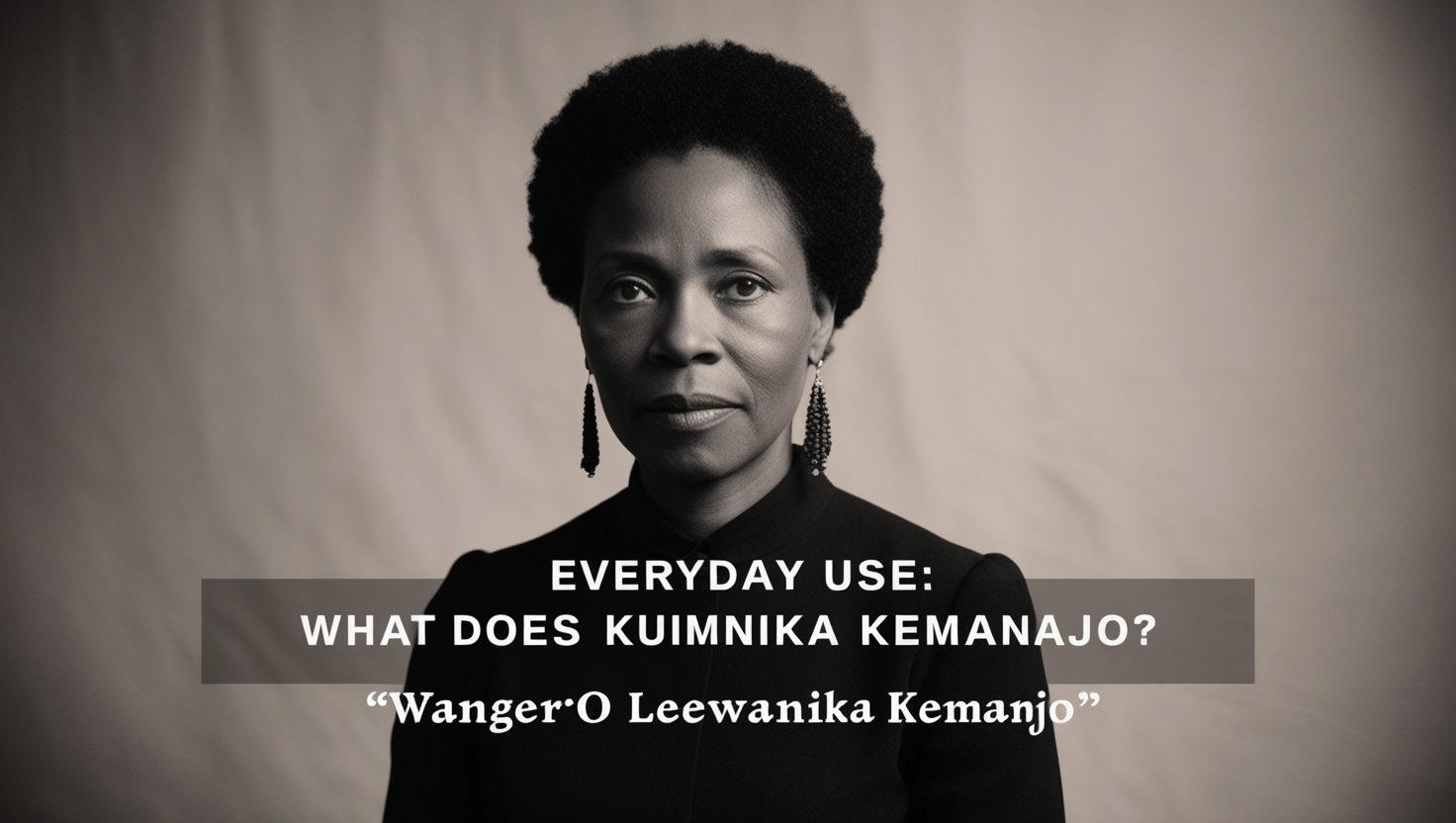In the world of literary exploration, names often carry profound meanings and intricate connections to the characters they represent. This is particularly true in Alice Walker’s short story “Everyday Use,” where one of the central characters, Dee, adopts the name “Wangero Leewanika Kemanjo.” To fully understand the depth and significance of this name, we must delve into the question: what does Wangero Leewanika Kemanjo mean?
Introduction to “Everyday Use”
Alice Walker’s “Everyday Use” was published in her 1973 collection In Love & Trouble: Stories of Black Women. The story explores themes of heritage, identity, and the contrasting perspectives on culture within an African American family. Dee, who later renames herself Wangero Leewanika Kemanjo, embodies the struggle between modernity and tradition.
Wangero: A Search for Identity
The first part of the name, Wangero, signifies Dee’s attempt to reclaim her African roots. But what does Wangero Leewanika Kemanjo mean in the context of this transformation? While the specific cultural or linguistic origin of Wangero is not detailed in the story, it reflects Dee’s desire to connect with her African ancestry and distinguish herself from the mistreatment she connects with her original name.
Leewanika: A Historical Tribute
The second component, Leewanika, is likely inspired by Lewanika, a prominent historical figure. Lewanika was a king of the Lozi people in what is now Zambia, ruling during the late 19th and early 20th centuries. He was known for his efforts to modernize his kingdom and negotiate with European powers. Thus, the name Leewanika connects Dee’s new identity to a figure of African resistance and leadership, shedding light on what Wangero Leewanika Kemanjo means in her quest for empowerment.
Kemanjo: An African Resonance
The final part of the name, Kemanjo, does not directly trace back to a specific cultural or historical reference. Instead, it seems chosen for its African-sounding resonance, fitting Dee’s intention of creating a name that connects her to her perceived heritage. This choice highlights her effort to construct an identity that feels authentic and rooted in African traditions.
The Symbolism Behind the Name Change
In “Everyday Use,” Dee’s decision to change her name to Wangero Leewanika Kemanjo symbolizes her complex relationship with her cultural identity. She rejects the name given to her by her family, associating it with a legacy of oppression. By adopting a new name, she believes she can better reflect her roots and aspirations. This transformation is central to understanding what Wangero Leewanika Kemanjo means in the broader context of the story.
A Contrast of Perspectives
While Dee’s name change is a significant personal statement, Walker uses it to critique her superficial understanding and romanticization of her heritage. Dee’s mother and sister, who continue to use their given names, represent a more practical and lived experience of their culture. This contrast is crucial in unpacking what Wangero Leewanika Kemanjo means in terms of authentic cultural identity versus performative gestures.
Heritage and Authenticity
Walker presents heritage as something that is lived and experienced daily rather than something that can be claimed through symbolic gestures alone. Dee’s new name, while outwardly connecting her to African roots, does not necessarily grant her a deeper understanding of her heritage. This dynamic is essential to exploring what Wangero Leewanika Kemanjo means in the narrative.
The Role of Names in Identity
Names play a critical role in shaping and expressing identity. Dee’s adoption of Wangero Leewanika Kemanjo is her attempt to redefine herself and assert a new identity. However, Walker suggests that proper understanding and appreciation of one’s heritage come from lived experiences and genuine connections rather than merely changing one’s name.
Cultural Disconnect
Dee’s actions, including her name change, reflect a cultural disconnect from her immediate family. Her mother and sister, who embrace the practical aspects of their heritage, view Dee’s new name and attitudes as superficial. This disconnect is a poignant aspect of what Wangero Leewanika Kemanjo means within the family dynamics portrayed in the story.
The Power of Reclamation
Despite the critiques, Dee’s attempt to reclaim her heritage through her new name highlights the power of self-definition. It underscores the importance of individuals taking control of their identities and narratives, even if the methods and understandings may be flawed. This complexity adds depth to what Wangero Leewanika Kemanjo means in the broader discourse of cultural identity.
Walker’s Commentary on Heritage
Alice Walker’s story serves as a commentary on how heritage and identity are perceived and valued. Through Dee’s character, Walker explores the tensions between different interpretations of cultural heritage. This exploration is key to understanding what Wangero Leewanika Kemanjo means in the literary and cultural critique embedded in the story.
Conclusion: The Essence of Heritage
In conclusion, the name “Wangero Leewanika Kemanjo” in Alice Walker’s “Everyday Use” is laden with symbolic meaning. It represents Dee’s attempt to reclaim her African heritage and assert a new identity. However, it also serves as a critique of superficial understandings of culture and the complexities of authentic heritage. Ultimately, what does Wangero Leewanika Kemanjo’s meaning encapsulate the story’s exploration of identity, heritage, and the diverse
FAQs About “Wangero Leewanika Kemanjo”
1. What is the significance of the name “Wangero Leewanika Kemanjo”?
The name represents Dee’s attempt to reclaim her African heritage and reject the oppression associated with her birth name in Alice Walker’s story “Everyday Use.”
2. Why does Dee change her name?
Dee changes her name to connect with her African roots and assert a new identity, distancing herself from the oppression linked to her original name.
3. What does “Wangero” mean?
“Wangero” is an African name chosen by Dee to signify her new identity, reflecting her desire to connect with African culture.
4. Who was King Lewanika?
King Lewanika was a ruler of the Lozi people in Zambia, known for modernization efforts. The name “Leewanika” in Dee’s new name connects her identity to this historical figure.
5. What is the origin of “Kemanjo”?
The name “Kemanjo” appears to be chosen for its African-sounding resonance, fitting Dee’s goal of connecting with her perceived heritage.
6. How does Dee’s family react to her new name?
Dee’s family sees her name change as superficial and continues to use their given names, highlighting a contrast in cultural understanding.
Read More Blog At HEALTHMAGZINE







